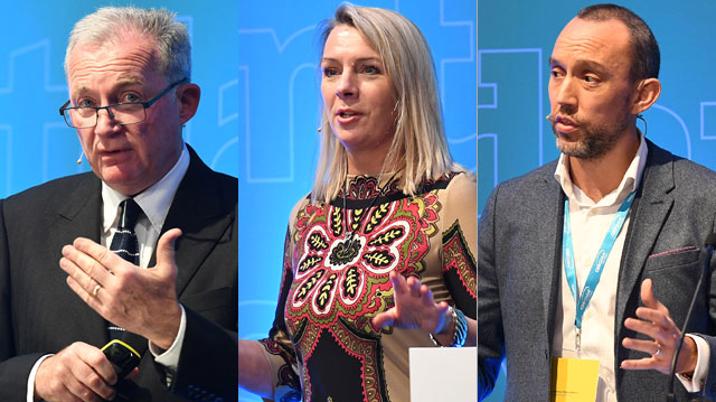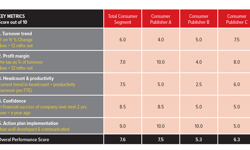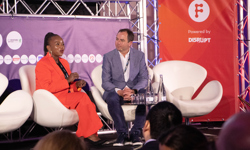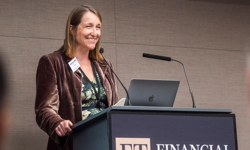
The conference consisted of a number of presentations and panels, and there was also one of the increasingly popular roundtable session where delegates could deep-dive into a particular subject. For me, five messages stood out from the day:
1. Prioritise, Prioritise, Prioritise
Jim Bilton kicked the morning off with a presentation based on the Publishing Futures research. There’s a danger, he said, of publishers trying to do too many things, and thereby running the risk of doing them badly. Publishers “can’t stop the waves coming in, but can surf them better” through effective prioritisation and striking the right balance between the need for change on the one hand, and avoiding needless chaos on the other. A key consideration when prioritising and knowing which projects to back and which to drop, was to have a clear idea of “what good looks like”. Know your KPIs!
2. Reach for the stars
Just because you’re a small publisher, it doesn’t mean you can’t have big ambitions. That was the message from Fraser Allen, CEO of White Light Media, organisers of World Whisky Day (WWD). WWD was the brainchild of Blair Bowman, who came up with the idea in 2012 while studying at the University of Aberdeen. His pitch to the whisky drinking world was: on this day, have a whisky, take a picture and post it online. Six years later, and now run by White Light Media, that simple premise has turned into a global proposition, spawning newsletters and events. Major drinks companies like Diageo have shown an interest and there are plans to create a global network of WWD ambassadors. Powerful content, a growing database, increasing exposure in both traditional and social media are helping to create an event so big, hopes Fraser, that “no whisky marketing manager will be able to ignore it”.
3. GDPR … err … it’s important
Simon Morrisey, a partner at law firm Lewis Silkin, gave a talk on the dry-but-scary topic du jour, GDPR. It was, he said and we all knew, the biggest change to data protection in a generation and directly impacts on how publishers engage with their customers, how they maintain the relationship with them and what information they collect and hold about them. Or put another way, everything.
It was important to see the opportunity, not just the threat, said Simon: “Clever people will work out the opportunity and realise that it’s not just about compliance.”
And, he warned, GDPR was not the end of it! New e-privacy regulations are in the pipeline, which will be even more impactful…
4. There’s more revenue out there
It’s all about maximising the commercial opportunities through exploiting multiple touchpoints. Jellyfish Connect’s Carola York compared the annual revenue from a typical customer journey for a consumer magazine subscriber now to that in the pre-digital age. Back when life was simple, the journey produced £67.98 of revenue for the publisher (consisting pretty much of the subscription payment itself), but now it was £611.97 (the subs payment, the bundle upsell, the book purchase, the holiday booking, event ticket, t shirt, mug et al).
It was important too, said Carola, to think beyond the subscriber file. There’s a huge potential audience outside your current list and the (achievable) challenge is how to monetise it.
5. Content marketing drives lead-generation
The oil that lubricates the modern publishing company is data and if you’re not constantly replenishing your prospect pool and communicating with them with premium content and offers, then you will, err … underperform.
For Motor Sport’s Gerard O’Brien, the cornerstone of their impressive data collection efforts is their longstanding Hall of Fame event, which they radically reengineered a couple of years back, by opening up the nomination and voting process to readers, effectively making the event a year-round activity. At a stroke, they unleashed phenomenal levels of reader engagement, which they have monetised through increased subscriptions, merchandise, archive access, ticket sales etc.
Wild Bunch Media’s David Castle had a similar transformative experience when they likewise opened up their running awards to readers. This is now, he said, their “biggest single driver of new registrations”.
The key lesson: if you can find the key to unlocking reader engagement, then the commercial opportunities are limitless.
As Jim Bilton said in his session, small publishers face a number of challenges; they tend to be less good at strategising and, inevitably, headcount and financial resource are constant headaches, but where they win out is in their nimbleness. Generally, they are better at implementation than bigger publishers. They have fewer hoops to jump through and less reports to write; they just do it.
Some of this article was previously published in InPubWeekly.












